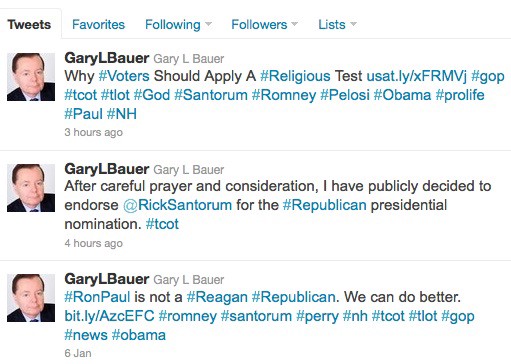The Cathovangelical: Rick Santorum's Quest for a National Abortion Showdown
by Abe Sauer

It’s a fine how-do-you-do. Fifty years after Democrats struggled to prove that their candidate for President “just happened to be a Catholic,” now they face the prospect of painting a Republican challenger as a dangerous follower of Rome’s socially extreme dogma.
The ascension of former Pennsylvania Senator Rick Santorum to maybe-viable contender for his party’s nomination and even a Pennsylvania Avenue address promises a number of rather unique possibilities. (Get ready for the “surprise” when he takes North Carolina.)
Most immediately, and a source of far more spiritual indigestion, a Santorum nomination would mean the most bloody dust-up over abortion and faith modern America has ever experienced. That’s exactly what a lot of people want — Santorum included.
In what almost seems like an impossible fact, the office of President has been held by twice as many Quakers as Catholics. [Thanks to the commenter for pointing that out!] Santorum would be only the second ever.
According to The Pew Forum on Religion, 31% of living Americans were raised Catholic but only 24% currently self-identify as Team Pope — and that’s with a boost from largely Catholic Hispanic immigration. Sensing a dwindling reserve of souls, Rome has launched a new $4-million “Catholics Come Home” campaign, with the goal of reactivating one million of the former faithful. And while 24% is not a voting base to sneeze at, Santorum is a new hybrid: a Cathovangelical.
Maybe because, to them, all far-right Christians look alike, much of the media often lumps Rick Santorum in with evangelical politicians. In some cases, Santorum is identified as “evangelical.” Even The New York Times is not immune.
Another reason for the confusion might be the way evangelicals have lined up behind Santorum. His Iowa surprise has justifiably been credited to the “retail politics” of gumption and Alfani shoe rubber. But also in Iowa, where evangelical leaders commonly appear in the press identified by the term “kingmaker,” Rick secured the pubic endorsement of Family Leader head Bob Vander Plaats, the kingmaker of Iowa kingmakers.
This misidentification also happens because of his outspoken positions on “family values.” Santorum’s extreme positions on abortion, gay marriage and even contraception — a key “Catholic” giveaway — knit him in well with the ultimate social goals of many top evangelical activists. Some evangelicals even claim to see through Santorum’s “ruse.” After the Iowa caucus, David Brody, the chief political correspondent for Pat Robertson’s Christian Broadcasting Network, wrote that Santorum “may technically not call himself an evangelical but he is definitely one when it comes to social issues. So don’t get too caught up in the title of ‘Roman Catholic.’ Santorum is an evangelical at heart.” Santorum, outed.
All this confusion is not on account of Santorum, who regularly states his denomination. In a 2007 Philadelphia Inquirer op-ed from his column cleverly titled “The Elephant in the Room,” Santorum began “How did my own Roman Catholicism shape my work as a senator?” On the way to an answer, he calls J.F.K. a “cop out.” (This is a guy who once told the National Catholic Reporter that Kennedy’s dismissal of his Catholicism did “great harm in America.”)
The real elephant in any room that Santorum happens to inhabit is abortion.
Most politicians, even pro-life ones, like to speak about abortion as little as possible. Put a pro-choice/pro-life position statement on the website and move on. There is simply no truck in it. There is no wiggle room. It’s dead on the stump. Few voters are on the fence about it. It cannot be spun. Say even the slightest wrong thing, your ass is grass. Why bother?
But Santorum? Santorum loves abortion.
* * *
According to an analysis by the Sunlight Foundation, in his 11-year span in Congress from January 1996 to January 3, 2007, Santorum “spoke the following words more than anybody else in the Senate: abortion, partial-birth, fetus, fetal, womb. He also uttered the following phrases more than anyone else: ‘base of the skull,’ and ‘life of the mother.’”
During his tenure, Santorum alone accounted for over 12% of all mentions of the term “abortion” and over 18 percent of all utterances of “fetus.”
In a general election against Obama, Santorum will no doubt go after the abortion subject, from the ramifications of “activist judges” to the limitations of science. Santorum has already started. In a January, 2011, interview with CNS News, Santorum criticized Obama for his opinion that a fetus is not a person under the Constitution. Santorum, blankly, said he found it “almost remarkable for a black man to say, ‘No, we are going to decide who are people, and who are not.’”
Santorum’s remarks were immediately criticized as racist by liberals, an outrage that was immediately criticized as despicable political correctness by conservatives, who see fetal life as the civil rights issue of the age. While it may seem anathema to political and media observers, a race-abortion showdown would be welcome by hard-right conservatives.
Once the litigious fringe, the Personhood Movement is now gaining nationwide recognition, if not victories. (Up next, Wisconsin.) While many pro-life candidates find the idea of personhood both a political bridge too far as well as a knotted mess of unintended consequences, they are forced to play host to the hardcore anti-abortion activists whose endorsements they depend on. For all its bravado and snarl, the Tea Party’s power still runs a far second to the pro-life movement, in part because it often overlaps. (It’s a misconception that the tactic of “primary-ing” an incumbent in one’s own party was invented by the Tea Party.)
Even America’s most popular entertainment is signaling to Santorum that the time is ripe for his cause. In just the last two months, two of the biggest box office hits with teen and younger audiences were Twilight: Breaking Dawn and The Devil Inside. Both had plots heavy on abortion. Americans seem like they’re chomping at the bit to answer the deep philosophical question opened by the court ruling of the former generation: When is life?
Slowly, on Facebook and on the backroads of conservative web pages and radio shows nobody talks much about, a detail is creeping into the running “socialist” criticism of Obama: The president has been to church only nine times since taking office. Add that to the fact that a Pew poll found 43% of American adults don’t know Obama’s religion and this is a battle Obama should take seriously. It’s certainly one where he is vulnerable — though only to Santorum.
* * *
Nothing will fuel a pro-life confrontation, and Santorum’s popularity, more than liberals continuing to ridicule Santorum for how the family dealt with a son that died two hours after premature birth in the 1990s. Santorum has publicly described how the family took the dead Gabriel home, slept with him, and had their other children “meet” him. Throbbingly useless person Alan Colmes mocked Santorum for “playing” with the dead child. He later apologized. The Washington Post’s Eugene Robinson went on Maddow and called the behavior “weird.” The blowback was immediate, intense and, more importantly, it even came from New England moderates.
Anyone who speaks with a number of obstetricians or neonatal nurses (such as Karen Santorum) will find the family’s was far from uncommon behavior. Presented with the anecdote, birth center professionals soberly asked what the big deal was. (And with just such a tragic event within my own close family, I can say from personal experience that further “criticism” of Santorum on this subject will only create sympathy, as well as giving him the window he and so many of his supporters want to talk about their favorite issue.) On Fox’s Hannity the night before the New Hampshire primary, Santorum brought up the criticism, and, like a machine, used it to plow into questions about the pro-life credentials of other candidates.
The follow-up effort that everyone can expect to see soon? That before meeting Rick, Karen Santorum cohabited with the OB-GYN founder of Pittsburgh’s first abortion clinic. It’s a bear trap the Santorum campaign is begging the media to step in.
* * *
The most under-cited piece of journalism informing the 2012 election is Warren Cole Smith’s April 5, 2008 “Divided We Stand” in the Christian publication World. In it, Smith chronicles “how several dozen leaders of the ‘Christian right’” came together in New Orleans to discuss “missteps in the [2008] GOP presidential campaign.”
There, Paul Weyrich (a founder of Moral Majority, Heritage Foundation and Council for National Policy), stood and admitted his gross fault in backing Romney simply on the issue of electability. The Christian right eventually fractured over supporting McCain over Huckabee. Meanwhile, the synod found Romney’s repeated pleas for their support more useless than a box of Trojans and Mitt gained “only a footstool at the Christian conservative table, whose leadership increasingly was troubled over his flip-flops on gay civil unions and abortion.”
When Mike Huckabee achieved mixed success courting evangelical power brokers in 2008, his pitch was, “The other candidates come to you. I come from you.” The plea moved some, but as Smith described, others were distracted with the notion of electability.
When Vander Plaats endorsed Santorum in Iowa, he said the exact same thing: “Rick Santorum comes from us — not just to us, from us.”
In South Carolina, Santorum just wrapped up the endorsement of hashtag-happy Gary Bauer, an evangelical former Reagan administration official, president of the Family Research Council and a senior VP of Focus on the Family, who now heads up the organization American Values and also serves the board of the Emergency Committee for Israel. He’s important. After endorsing McCain in 2008, Bauer had declined to back anyone this cycle, but then noted that “it has become obvious that conservative voters are deeply divided about who should carry the banner for our values into the 2012 election.”

In the coming months, when pro-Santorum forces use the term “values,” they are not just talking about conservative pro-life/”pro-family” values versus liberal ones. They are talking about Romney and Mormonism. In his 2007 Chronicle piece, Santorum painted what might be a dire prophecy for a Romney-Santorum showdown in 2012: “Romney is a Mormon because he accepts the beliefs of the Mormon faith. This permits us, therefore, to make inferences about his judgment and character, good or bad.” Indeed, an hour after tweeting his endorsement for Santorum, Gary Bauer sent a link to his new USA Today column. Titled “Why voters should apply a religious test,” the piece is an astoundingly naked indictment of Romney’s Mormonism, going so far as top basically compare it to being Wiccan: “After all, Wicca involves magic, spell-casting and sorcery — not exactly mainstream religious practices.”
Mitt Romney is still the presumptive and even presumptuous Republican nominee, mainly because of this “electability.” But what if Republicans, despite the “anyone but Obama” mantra, don’t want to elect anyone as much as they want to force a showdown between Obama and a candidate as starkly different as possible? The running line is that conservatives are struggling with whether to compromise or to position for the best chance at winning an election, to have a candidate as much like Obama as possible to woo independents. But that storyline is four years too old. Conservatives already feel as if they compromised, to disastrous results, in 2008. The 2012 election is a do-over for conservative Christian leaders and voters.
Given how the Tea Party — which is now inseparable from the Christian right — has behaved so far, it’s plumb stupid to think it wouldn’t relish the chance to go down swinging with a principled candidate, bloodying everyone in the process.
Abe Sauer is the author of the book How to be: North Dakota and bets Rick Santorum will be Romney’s VP. He is on Twitter. Email him at abesauer @ gmail.com. Photo from Santorum 2012’s Facebook.
